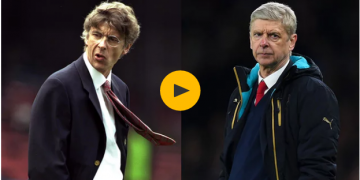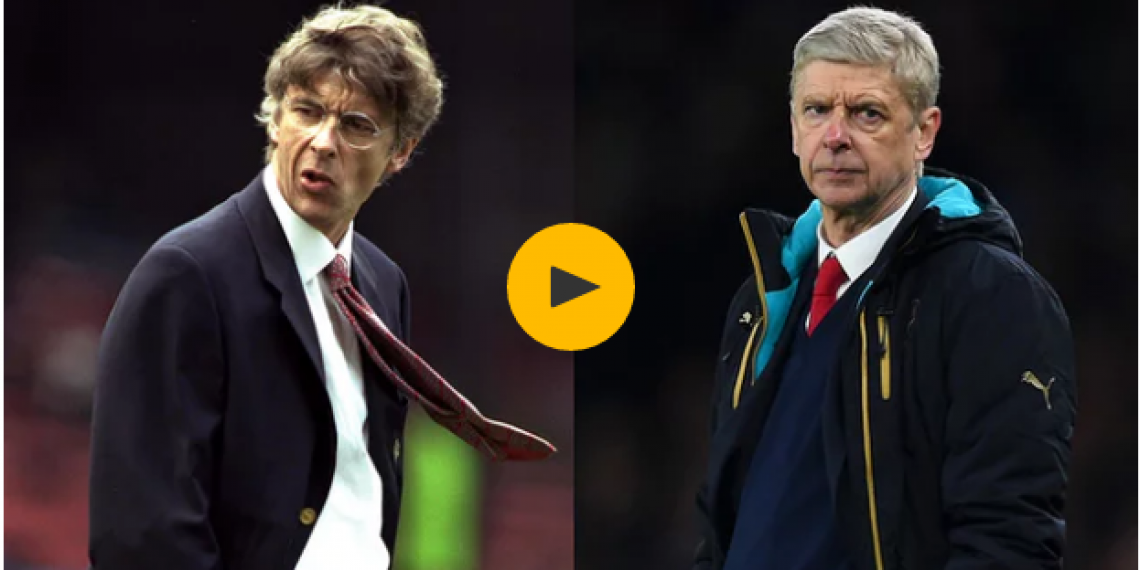To fully comprehend how much England’s top-flight has changed since Arsene Wenger first strode into Highbury’s famous marble halls for his official unveiling on 22 September 1996, a list of the other managers employed in the Premier League that day is most instructive.
Six years after the Czech Jozef Venglos became the first born outside Britain or Ireland to take charge of a top division club, Ruud Gullit – hired by Chelsea a few months previously to replace the new England manager Glenn Hoddle – was the only foreigner in a job, with the remainder all largely familiar faces steeped in the traditions of the old school.
Tottenham had briefly flirted with Ossie Ardiles but reverted to the tried and tested when the Argentinian was sacked in November 1994. Wenger’s arrival changed all that. By the turn of the century, five more had cut their teeth in the Premier League and the number now stands at more than 50, including all of last season’s top eight clubs.
The revolution took some time to build momentum, however, with Wenger guiding Arsenal to third place after beating Blackburn 2-0 in his first match. Of the other clubs in the division that season, 220 managers have been appointed, with two of the clubs (Nottingham Forest and Southampton) making 17 apiece.
That means the other 19 clubs have had an average of more than 11 different managers since Wenger’s arrival, while none of the men who were in their posts that autumn day 20 years ago are still involved in club management.
Aston Villa: Brian Little
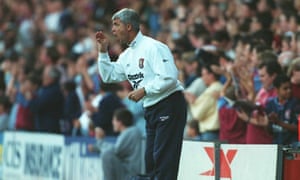
After guiding Villa to fifth following their League Cup win the previous season, Little lasted until February 1998 before he resigned following a disastrous run that left them struggling in the bottom half of the table. The former striker went on to manage Stoke, West Bromwich Albion, Hull, Tranmere, Wrexham, Gainsborough Trinity and Jersey before stepping down in May this year following his appointment as an adviser to Villa’s new board.
Final league position: 5th
Permanent managers since September 1996: 11
Current league position: 18th (Championship)
Blackburn: Ray Harford
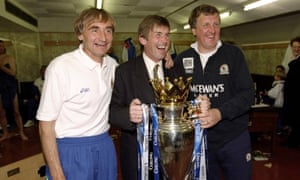
The 1995 Premier League champions were Wenger’s first opponents on 12 October 1996, when two goals from Ian Wright gave Arsenal a 2-0 win. Harford, the former assistant who had stepped up to replace Kenny Dalglish a year earlier, lasted only two more weeks and was eventually replaced by Roy Hodgson. He later had spells at West Brom, QPR and Millwall before succumbing to lung cancer in August 2003.
Final league position: 13th
Permanent managers since September 1996: 13
Current league position: 23rd (Championship)
Chelsea: Ruud Gullit
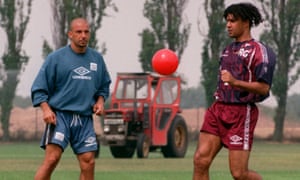
The only non-British or Irish manager in the Premier League when Wenger arrived, Gullit steered Chelsea to the FA Cup in May 1997 – their first major trophy in 26 years. But the Dutchman was surprisingly sacked the following season with the club second in the table behind Manchester United and went on to manage Newcastle, Feyenoord and LA Galaxy, although his last managerial post with the Russian club Terek Grozny in 2011 lasted less than six months.
Final league position 1996-97: 6th
Permanent managers since September 1996: 14
Current league position: 5th
Coventry City: Ron Atkinson
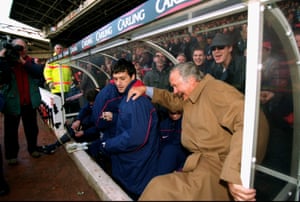
After guiding Coventry away from trouble the previous season, Atkinson moved “upstairs” to become director of football in November 1996 and was replaced by Gordon Strachan – then a sprightly 39-year-old who still occasionally pulled on his boots. Atkinson went back to Sheffield Wednesday a year later before famously sitting in the wrong dugout before a match against Arsenal on the first day of his final managerial post at Nottingham Forest. “I just happened to look around and I’m stood with Dennis Bergkamp, Patrick Vieira, Nelson Vivas,” he recalled. “I thought: ‘How are we bottom of the league with these in the team?’” His book, The Manager, was released this month.
Final league position 1996-97: 17th
Permanent managers since September 1996: 14
Current league position: 24th (League One)
Derby County: Jim Smith
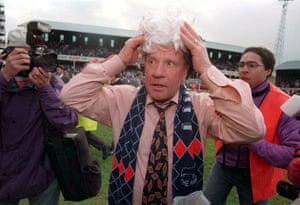
By 1996, “The Bald Eagle” was in his ninth job as a manager and had just guided Derby back to the top flight after five seasons away. A 12th-place finish was the club’s highest for eight years and Smith remained at the helm until 2001, when Derby were relegated. He spent two more spells at Oxford United as permanent and then caretaker manager before retiring in 2009.
Final league position 1996-97: 12th
Permanent managers since September 1996: 12
Current league position: 20th (Championship)
Everton: Joe Royle
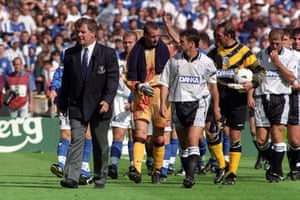
Despite winning the FA Cup just 16 months earlier – Everton’s last piece of silverware – tensions between Royle and the club’s board were already beginning to mount by September 1996. A difficult season saw them end up 15th, but only after the former striker had resigned in March following a disagreement with the board on transfer deadline day. Royle went on to manage Manchester City, Ipswich and Oldham for a second time and is now back at Goodison Park as professional development coordinator.
Final league position 1996-97: 15th
Permanent managers since September 1996: 6
Current league position: 2nd
Leeds United: George Graham
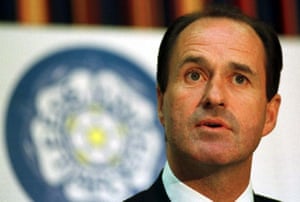
Graham had succeeded Howard Wilkinson 10 days before Wenger was unveiled at the Scot’s former club, Arsenal. It was only a few months after the expiration of the one-year ban imposed on Graham by the Football Association following the bung scandal but he led Leeds away from trouble and ended up staying at Elland Road until October 1998, when he moved to Tottenham. That proved to be his final managerial post, lasting nearly three years at Arsenal’s bitter rivals.
Final league position 1996-97: 11th
Permanent managers since September 1996: 16
Current league position: 15th (Championship)
Leicester City: Martin O’Neill
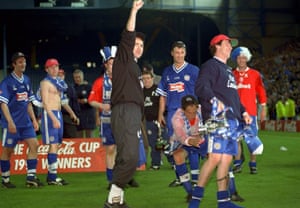
Tipped for relegation by many, Leicester confounded expectations by finishing in the top half of the table and winning the club’s first major trophy for 33 years when they beat Middlesbrough in the League Cup final. O’Neill remained in the post until June 2000, when he joined Celtic, and has since taken charge of Aston Villa and Sunderland before taking up his current role with the Republic of Ireland in November 2013.
Final league position 1996-97: 9th
Permanent managers since September 1996: 14
Current league position: 11th
Liverpool: Roy Evans
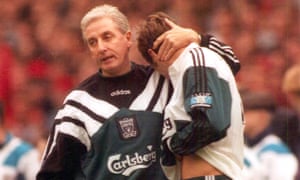
It looked like a new era of dominance could be about to begin just as Wenger arrived in north London but Roy Evans’s side failed to build on a spectacular start to the season that had seen them top the table over Christmas. A fourth-place finish was a huge disappointment and perhaps with covetous glances at the Frenchman making waves at Highbury, Gérard Houllier was appointed in the summer of 1998 – initially alongside Evans. That didn’t last too long, with Evans making way and eventually going on to have a spell as Fulham caretaker, Wales assistant and as director of football at Swindon Town.
Final league position 1996-97: 4th
Permanent managers since September 1996: 7
Current league position: 6th
Manchester United: Alex Ferguson
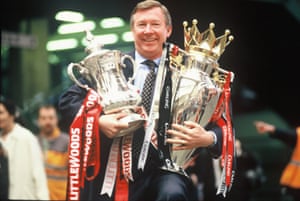
Thrashed 5-0 by Newcastle less than a month after Wenger’s unveiling, it appeared that Fergie might be losing his touch. But a surge in the second half of the season helped United retain their title ahead of Kevin Keegan’s Newcastle. “What does he know about English football, coming from Japan?” Ferguson had asked on Wenger’s arrival, although their rivalry took a while to really warm up with Arsenal’s title triumph in 1998. “Perhaps he sent it by horse?” replied Wenger after his counterpart claimed he had apologised after another spat a year later. It was to become a recurring theme until Ferguson’s retirement in 2013.
Final league position 1996-97: 1st
Permanent managers since September 1996: 4
Current league position: 7th
Middlesbrough: Bryan Robson
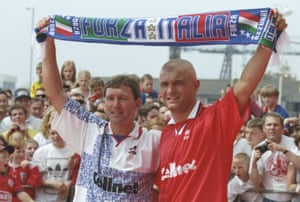
The purchase of Brazilian midfielder Emerson and Italian striker Fabrizio Ravanelli had raised expectations on Teesside but a season that had promised so much ended in relegation and defeats in both the League and FA Cup finals. A three-point deduction after Robson said he was unable to field a team against Blackburn due to a severe injury and illness crisis ended up being crucial, with the manager even making an appearance off the bench against Wenger’s Arsenal at Highbury. He led them back to the Premier League at the first attempt before eventually leaving in 2000 and has since had spells at Bradford, West Brom, Sheffield United and with Thailand.
Final league position 1996-97: 19th (relegated)
Permanent managers since September 1996: 6
Current league position: 13th
Newcastle United: Kevin Keegan
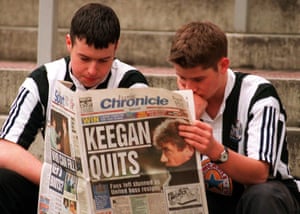
After throwing away a 12-point lead the previous season that led to their manager’s infamous rant at Ferguson, Newcastle started the new campaign with renewed hope after spending a world record £15m on Alan Shearer. But the 5-0 victory over United was as good as it got. Keegan shocked the Toon Army in January by announcing his resignation, claiming he had “taken the club as far as I can” amid rumours of a fallout with the owner Sir John Hall. Kenny Dalglish stepped into the breach and guided them to another second place, while Keegan went on to manage Fulham, England and Manchester City before an ill-fatedreturn to St James’ Park in 2008 that remains his last job in management.
Final league position 1996-97: 2nd
Permanent managers since September 1996: 15
Current league position: 3rd (Championship)
Nottingham Forest: Frank Clark
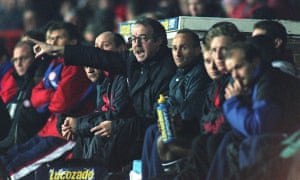
Forest never recovered from a poor start to the season and by the time Arsenal visited the City Ground in December, Clark had been sacked. The caretaker Stuart Pearce inspired a surprise 2-1 victory for the league’s bottom side but the task of saving the two-times European Cup winners proved beyond even him. Clark – who had been linked with the England job before the FA opted for Glenn Hoddle – was out of work for approximately a week, when Manchester City appointed him to replace Steve Coppell. That proved to be his last post and he was last seen serving as Forest chairman before being unceremoniously sacked as club ambassador in 2013.
Final league position 1996-97: 20th (relegated)
Permanent managers since September 1996: 17
Current league position: 13th (Championship)
Sheffield Wednesday: David Pleat
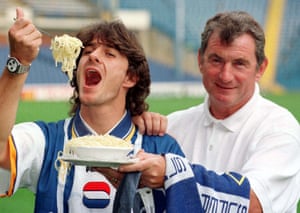
Top of the table after four straight wins to begin the season, things soon unravelled for Pleat. They ended the season a respectable seventh despite a dramatic collapse in form before Christmas, including a 4-1 thumping at Highbury after Des Walker was sent off. Pleat lasted only another few months at Hillsborough and returned to Tottenham as director of football, stepping in as caretaker on two occasions – neither of which yielded a victory over the biggest rivals. He remains part of the furniture at White Hart Lane as a consultant and was instrumental in the signing of Dele Alli from MK Dons last year.
Final league position 1996-97: 7th
Permanent managers since September 1996: 14
Current league position: 14th (Championship)
Southampton: Graeme Souness
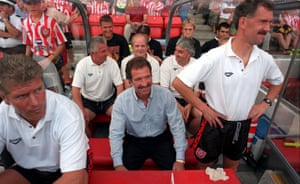
Brought in to replace Dave Merrington in the summer, Souness spent only one season on the south coast but it was far from boring. Perhaps his finest hour wasthe signing of striker Ali Dia, supposedly on the recommendation of his cousin, 1995 Ballon d’Or winner George Weah, until it turned out that Dia was actually Senegalese and not related to Milan’s Liberian striker. Souness left in the summer to join Torino but lasted only four months before jumping ship to Benfica, Blackburn and then Newcastle. Observer Sport Monthly voted the Scot as the Worst Football Manager two years after he left St James’ Park with the club flirting with relegation and he hasn’t been seen in the dugout since.
Final league position 1996-97: 16th
Permanent managers since September 1996: 17
Current league position: 14th
Sunderland: Peter Reid
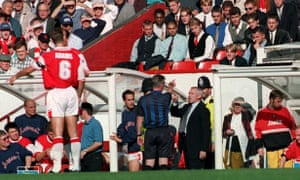
Despite home victories against Chelsea, Manchester United and Wenger’s Arsenal in the last season at Roker Park, Sunderland went down on the final day of the season with 40 points following Coventry’s great escape act. Reid stayed in his post and saw his team lose in the playoff final to Charlton the next season before finally returning to the Premier League in 1999. Consecutive seventh-placed finishes cemented their top-flight status but Reid was eventually sacked in 2002 after nearly eight years at the club. His most recent job was as an assistant at Bolton last season.
Final league position 1996-97: 18th (relegated)
Permanent managers since September 1996: 13
Current league position: 19th
Tottenham Hotspur: Gerry Francis
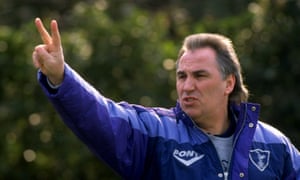
Having finished just two points behind Arsenal the previous season, Spurs supporters hoped that this could be the year they could claim bragging rights in north London. It didn’t turn out that way, however, with a 3-1 defeat at Highbury in November beginning Wenger’s hegemony. They ended up 10th and Francis was gone a few months later, to be replaced by Tottenham’s own version of Wenger, the Swiss Christian Gross. A year later, Francis returned to QPR and then Bristol Rovers in 2001 but has not held a managerial post since leaving six months later, although he been part of the coaching staff at Crystal Palace and Stoke, among others.
Final league position 1996-97: 10th
Permanent managers since September 1996: 11
Current league position: 3rd
West Ham: Harry Redknapp
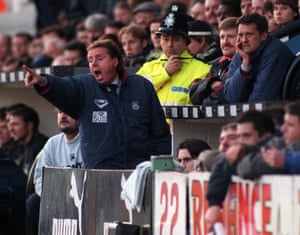
Redknapp had just embarked on his third season as manager and the arrival of imports like Florin Radiciou and Paulo Futre were welcomed at Upton Park. But they ended up having to rely on youth team products Rio Ferdinand and the manager’s nephew Frank Lampard, who had made his debut against Arsenal on the season’s opening day, to survive relegation. Redknapp’s first clash with Wenger came in January and resulted in a 2-1 home defeat – the first of 14 Premier League victories for the Frenchman over his rival in 29 meetings. Now a TV pundit and director of Wimborne Town.
Final league position 1996-97: 14th
Permanent managers since September 1996: 8
Current league position: 18th
Wimbledon: Joe Kinnear
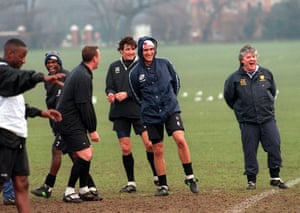
Seventeen years before he called Newcastle’s star midfielder Yohan Kebab despite being the club’s director of football, Kinnear was seen as a rising star in the managerial world. Beaten 3-0 on the opening day after David Beckham’s wonder goal for Manchester United, Wimbledon recovered and went on to reach the semi-finals of both cup competitions as well as beating Wenger’s Arsenal at Highbury in February. Kinnear stayed with The Dons until March 1999, when he suffered a heart attack before a game, and went on to manage Luton and Nottingham Forest before his two spells at Newcastle in 2008 and 2013.
Final league position 1996-97: 8th
Permanent managers since September 1996: 8
Current league position: 18th (League One)
Credit: GUARDIAN
